Making changes to sustain us
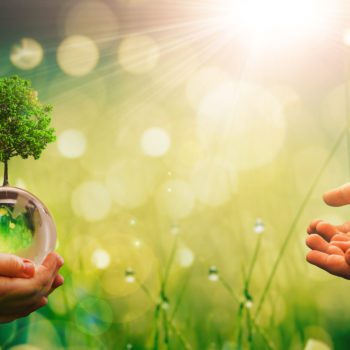
Sustainability is the new buzz word in business and rightly so as every single part of the manufacturing and processing of products and materials needs to be rethought with sustainability in mind in order to turn the tide of global warming or at least slow it down. Fionnuala Carolan looks at the many impressive initiatives happening in the FMCG sector at present
24 March 2022
We are fast running out of time to save the planet. Some of the damage to our planet is already irreversible but the huge appetite and frankly the necessity for change has made companies radically rethink how they do business. In the retail industry alone we are seeing a huge increase in initiatives to promote the circular economy with the likes of the deposit return scheme for drinks containers and massive investment in solar power and green transport, alongside reductions in water use during production and packaging.
Regenerative agriculture projects are challenging age-old farming methods in order to work in harmony with nature to put back more than it takes out, protecting the future of the planet for our children and grandchildren and beyond. It’s hard not to be impressed by the level of change and thinking outside the box that is happening globally. We have compiled some of the most inspiring and ambitious initiatives already happening here at home by the likes to Coca- Cola, Bulmers, SuperValu, Aldi, Danone and Tomra.
Net Zero by 40 action plan
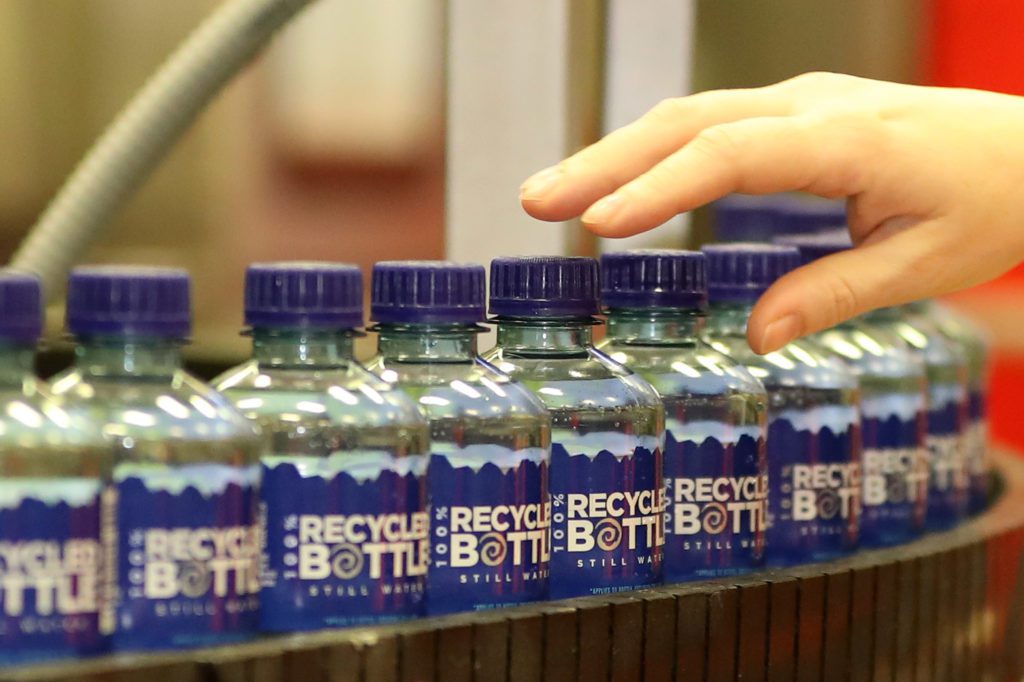
Coca-Cola HBC Ireland and Northern Ireland is following its group commitment, pledging to achieve net zero emissions across its entire value chain by 2040
The Coca-Cola HBC Group was one of the first companies to commit to and deliver science-based targets and in the last decade its business across the island of Ireland has cut direct emissions by 60%, reducing its carbon intensity by more than 47,000 tonnes. This has been achieved by significant improvements in energy use, waste management, reduced packaging and water consumption.
Coca-Cola HBC Northern Ireland and Ireland is targeting a further 60% reduction in direct emissions by 2030, based against 2017 levels. To address the 90% of emissions in scope 3 resulting from third party actions, CCHBC will broaden its existing partnership approach with suppliers. Wherever emissions cannot be eliminated entirely, the business will mitigate these by investing in other climate protection measures.
Among the actions which will drive emissions lower are further reductions in packaging through investment, innovation and taking a leadership role in developing a new deposit return scheme for Ireland. Additional investment in green transport will increase the use of electric and low carbon vehicles. Rolling out more efficient refrigeration units in stores will not only help to reduce CCHBC’s emissions but will also support customers in achieving their goals. Partnerships with FoodCloud and FoodShare will further drive down waste and emissions.
Raising a glass to a better world
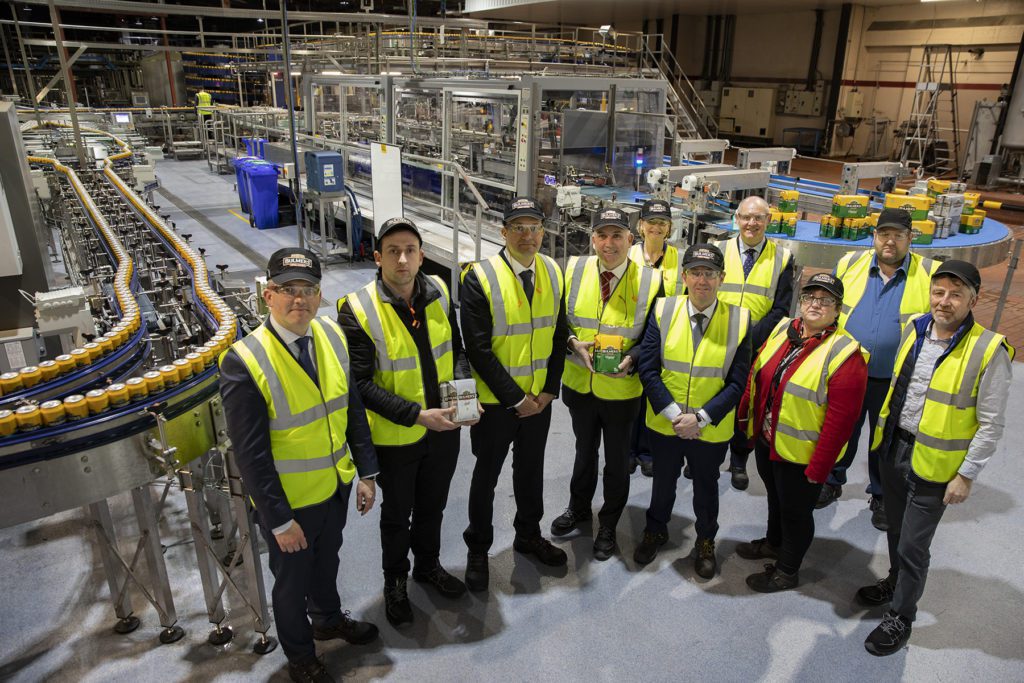
Tánaiste Leo Varadkar opens the Bulmers sustainability project in Clonmel Pictured are Senator Garret Ahearne, Pat Halley, general manager Bulmers, Tánaiste Leo Varadkar, David Forde, CEO C&C Group, Deirdre Clune, MEP, Cllr Michael Murphy, Cllr John Fitzgerald, Cllr Marie Murphy, Anthony Dignam, project manager Bulmers, Derek Nolan, packaging manager Bulmers
Leo Varadkar, Tánaiste and Minister for Enterprise, Trade and Employment, officially opened C&C Group’s new sustainability project at the Bulmers Cider manufacturing facility in Clonmel Co. Tipperary on Friday, 18 February. This project forms part of C&C Group’s broader ESG strategy and commitment to delivering to a better world. The Bulmers Sustainability Project includes the installation of what is now the largest rooftop solar panel farm in Ireland, which will reduce the Clonmel site’s carbon emissions by 4%, saving 286,746kg of CO2 per year and almost 10 million kgs over the next 20 years.
The solar panels provide 10% of electricity used onsite, meaning 100% of the electricity used in the Bulmers manufacturing facility in Clonmel is provided by renewable sources.
Additionally, the Company committed significant investment into ‘dry end’ packaging machinery to reduce the environmental impact and ecological footprint of consumer packaging. As of January 2022, plastic is no longer used in the packaging of C&C Group’s canned products in Clonmel, which will result in 100 million mid-cone rings per annum being removed from the environment. These initiatives form part of C&C Group’s comprehensive ESG strategy, which include working with the Science Based Targets initiative (SBTi) to reduce Scope 1 and 2 emissions by 35%, and Scope 3 emissions by 25% by 2030.
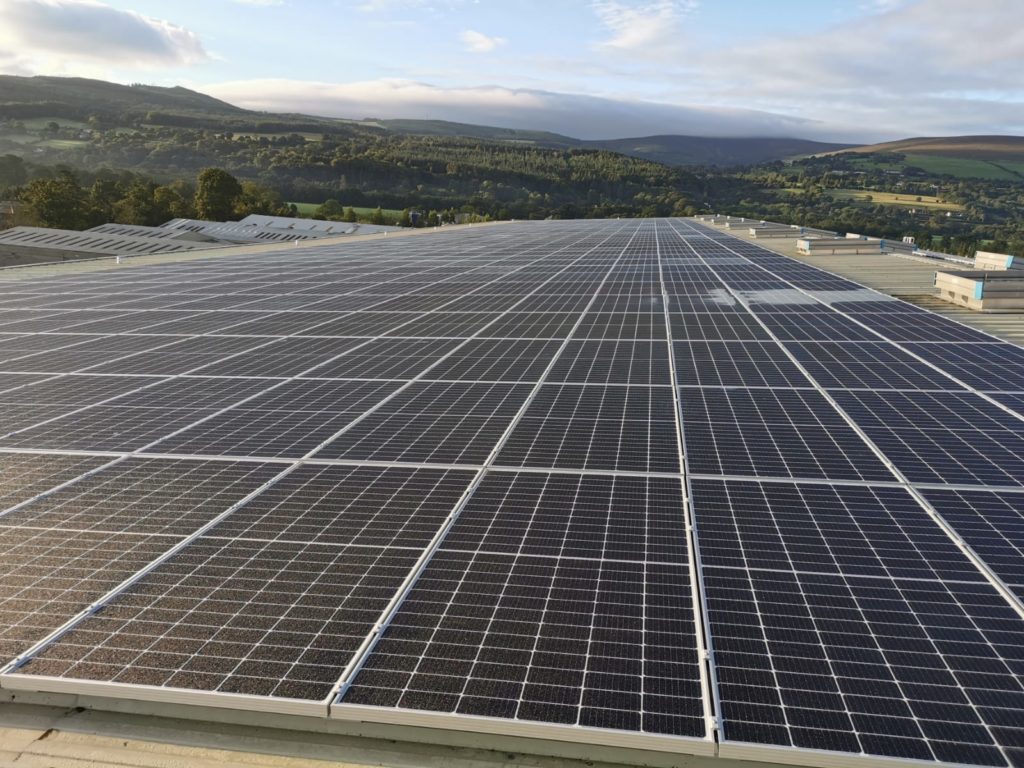
Ireland’s largest rooftop solar panel farm in the Bulmers site in Clonmel, Co Tipperary
C&C Group has also pledged to be a carbon-neutral business by 2050. The Tánaiste said: “Congratulations to C&C Group for making these changes, which will reduce the Clonmel site’s overall emissions by 4% and the environmental impact from the packaging of Bulmers and other canned products. Enterprise has a really important role to play in bringing down our emissions and it’s great to see companies taking the lead and setting an example with their actions. We recently launched a website, www.climatetoolkit4business.gov.ie, which is a good place to start for any company thinking of making changes themselves.” Joining the Tánaiste, colleagues from the Bulmers site in Clonmel to officially open the project, C&C
Group CEO, David Forde, commented: “I am delighted to welcome Tánaiste, Leo Varadkar to celebrate the official opening our Bulmers Sustainability Project, an ambition our colleagues here in Clonmel have worked incredibly hard to deliver and one we are immensely proud of. This initiative forms part of our broader C&C Group ESG strategy and demonstrates our commitment to be a carbon neutral business by 2050 and deliver to a better world.” For more information on C&C Group’s ESG strategy visit https://candcgroupplc.com/esg/
The rise of reverse vending machines
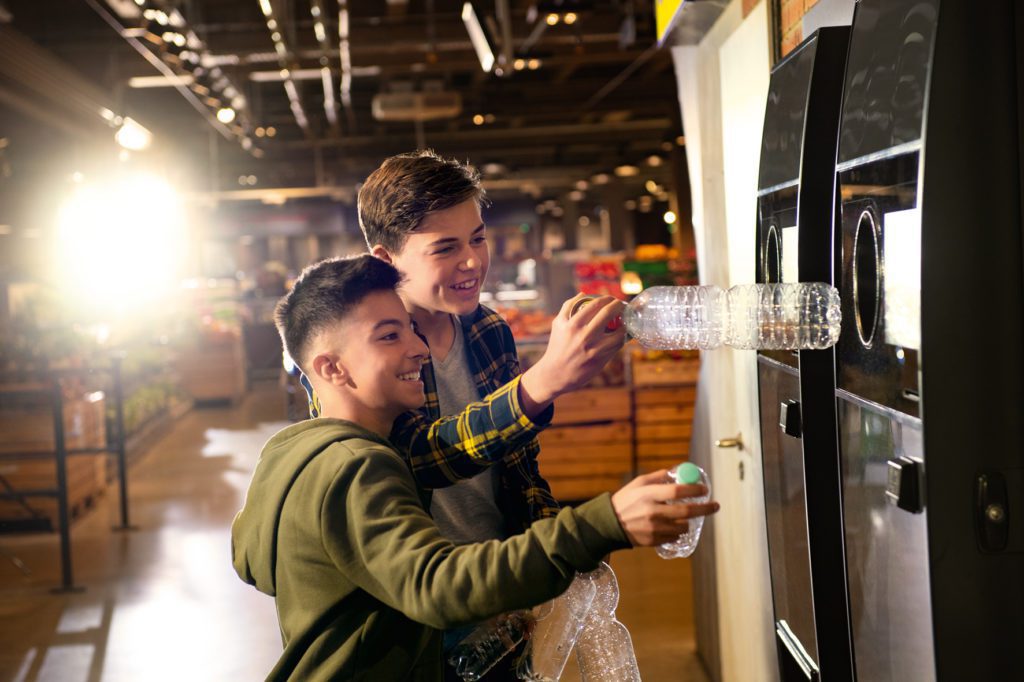
The deposit return scheme will help to tackle the estimated 1 billion plastic bottles and 1.6 million aluminium cans that are thought to currently end up in landfills
Ireland’s deposit return scheme (DRS) is an exciting step in the country’s transition to a more circular economy. The scheme will help to tackle the estimated 1 billion plastic bottles and 1.6 million aluminium cans that are thought to currently end up in landfills/incinerators or littered in the environment (Source: Voice Ireland).
As Ireland’s DRS is planned to be a ‘return to retail’ scheme, this will represent a huge shift in how shoppers interact with retailers when it comes to sustainability. Once the scheme goes live, retailers will have a much more visible role in the recycling process, by accepting empty drinks containers back and returning the deposit to the consumer.
It will be important for retailers to create a returns process which is simple to use, quick and engaging for both shoppers and store staff. Retailers will have the choice of whether to accept containers back manually or to automate the process with a reverse vending machine. In other countries around the world, retailers who sell larger volumes of drinks containers usually see a benefit in efficiency and overall experience when using a reverse vending machine.
The deposit return scheme will be a change for retailers in Ireland, but DRS is a tried and tested system running successfully in many countries including in Norway, Sweden, Finland, and Germany, amongst others. In these countries, retailers successfully provide this recycling service for their shoppers, and it has become a part of the overall shopping experience expected by consumers.
Q&A with… Mark Brill, VP sales and marketing, Tomra Collection UK & Ireland
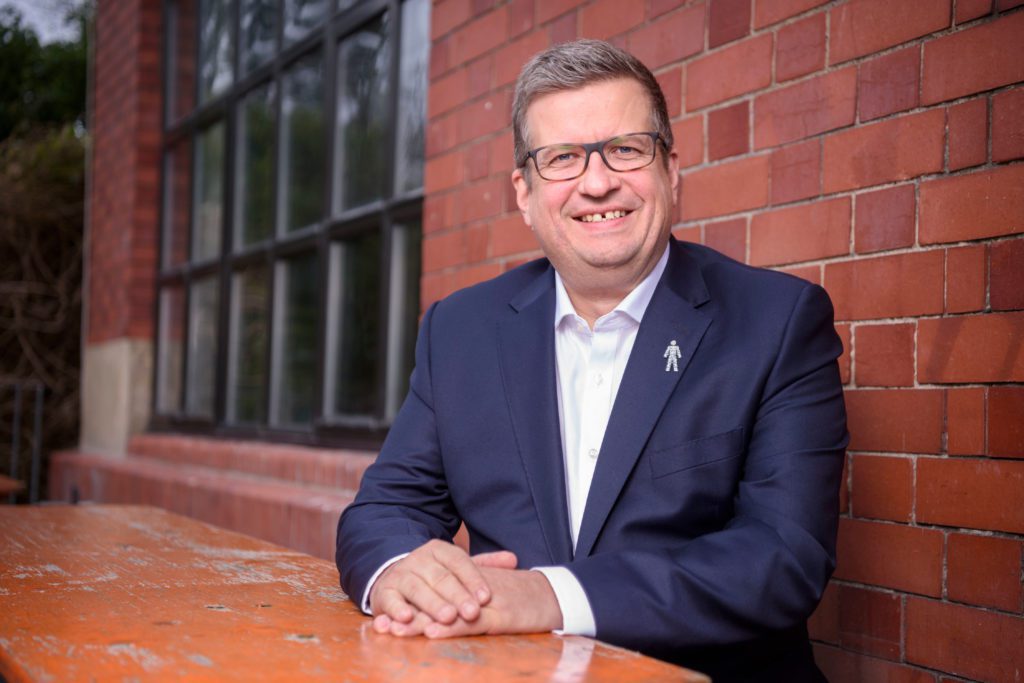
Mark Brill
With the Deposit Return Scheme (DRS) expected to become operational in the Republic of Ireland by Q3 of 2022, how many retailers are you currently working with in Ireland to install reverse vending machines? What are your growth targets for 2022?
We are already working with a number of retailers in getting ready for Ireland’s deposit return scheme, helping them to test solutions and review the right range for their stores. We expect to be speaking to many more retailers once the final timeline and details for the scheme are announced and we’re excited for activity levels to increase.
What are the advantages to retailers of installing reverse vending machines in terms of cost and time savings?
The benefits of installing a reverse vending machine include time saving, space saving, increased accuracy, and improved customer experience. On the operational side, having a machine means that store colleagues will not have to process each container manually and overall storage space is reduced because containers are crushed inside the machine. On the consumer side, shoppers generally like the ease and speed that a reverse vending machine offers.
Space is a precious commodity in stores – particularly those with a smaller floor space – how can you deliver options that maximise the available space and fit retailers’ needs?
We are conscious that space is incredibly valuable in stores and Tomra has a range of machines suitable for smaller locations. The smallest suitable machine we have is the new TomraM1, which is only 0.6sq m, designed to enable stores with the smallest footprint to benefit from automation.
What lessons have you learnt from the other markets you operate within in terms of encouraging repeat consumer visits, as well as making reverse vending machines user-friendly and easier for retailers to maintain?
In countries that already have a DRS we see that shoppers often return their containers and shop in the same store, often using their deposit refund voucher. This means that creating a good returns process can attract shoppers to spend money at the store. We know from research that a good returns process for shoppers is clean, easy to use and fast, so we always bear this in mind when advising retailers on solutions.
Sustainability is obviously a driving force behind reverse vending. What achievements are you most proud of within this area?
Sustainability is at the core of Tomra’s mission and we’re proud that the machines used by our customers contribute to a reduction in CO2 emissions. In 2020, our customer’s reverse vending machines helped to avoid about 4.5 million tonnes of CO2. It’s great to enable people across the world to easily participate in the circular economy.
Looking ahead, Tomra has set the ambition to increase the collection of plastic in a closed loop system from the current level of 2% to 30% by 2030. Achieving these goals will require collaboration across industries, and we are excited to play our part in this.
A challenge for Ireland

According to Repak, the new plastic packaging recycling targets will be more challenging for Ireland
According to Repak, at present Ireland meets all of the previous EU targets set in the Packaging and Packaging Waste Directive. In fact, we already exceed 2025 targets for wood (53%) and paper and cardboard (79%). In the case of glass recycling we already exceed our 2030 targets with a current recycling rate of 84%.
However the new plastic packaging recycling targets will be more challenging for Ireland to meet and present an opportunity for Ireland to change the way in which we manage these often complex materials which currently have a recycling rate of 31%.
To achieve the new EU targets of 50% by 2025 and 55% by 2030 will require a dramatic change by all stakeholders in order to capture more of this material.
What can you do?
First of all, it is important to note that there are certain legal obligations on Irish businesses when it comes to the segregation of packaging waste.
Regulation 5 of the European Union (Packaging) Regulations 2014 as amended states that:
– Producers should ensure that packaging waste is separated at source, by material type.
– Packaging waste should be collected by a contractor for the purposes of recycling.
If you need support, please do not hesitate to contact our membership team who will be able to help.
Ireland’s most sustainable supermarket
Irish shoppers have voted Aldi as the most sustainable supermarket in Ireland according to the Ireland Sustainability RepTrak Index 2021. The findings announced today are based on a comprehensive survey of 7,000 members of the public during January to March 2021.
The annual Ireland Sustainability RepTrak Index focuses on the sustainability segment of the Ireland RepTrak 2021 survey, a study of 100 of the largest, most important and most visible organisations in the country. Earlier this year, Aldi achieved an “Excellent” reputation rating in the RepTrak survey, gaining the title of Ireland’s most reputable supermarket. The Index rates Ireland’s top performing organisations across key sustainability dimensions – governance, workplace, and citizenship – three dimensions across which Aldi has scored consistently well.
Commenting on the latest achievement, Niall O’Connor, group managing director, Aldi Ireland said: “Irish shoppers voting Aldi as the most sustainable supermarket is testament to the hard work and commitment from all of our staff and suppliers….We continue to lead the market in pay and benefits for our colleagues, work both nationally and internationally to ensure we adhere to the highest standards of corporate governance, and work with local communities across the cities and towns of our 148 stores to effect positive change.”
Aldi is committed to its sustainability practices and is working to tackle many societal issues including plastic packaging waste and food waste. Over 95% of Aldi’s range of private label range of products are now recyclable with the removal of over 2,150 tonnes of virgin plastic, the transition of 930 tonnes of non-recyclable packaging to recyclable packaging and the removal of difficult to recycle plastics from Aldi’s 148 stores.
Aldi also has a long-running partnership with the social enterprise, FoodCloud since 2014, donating over 2.25 million meals to over 200 charities saving the charity sector over €2.6 million.
Danone Ireland announces B Corp accreditation
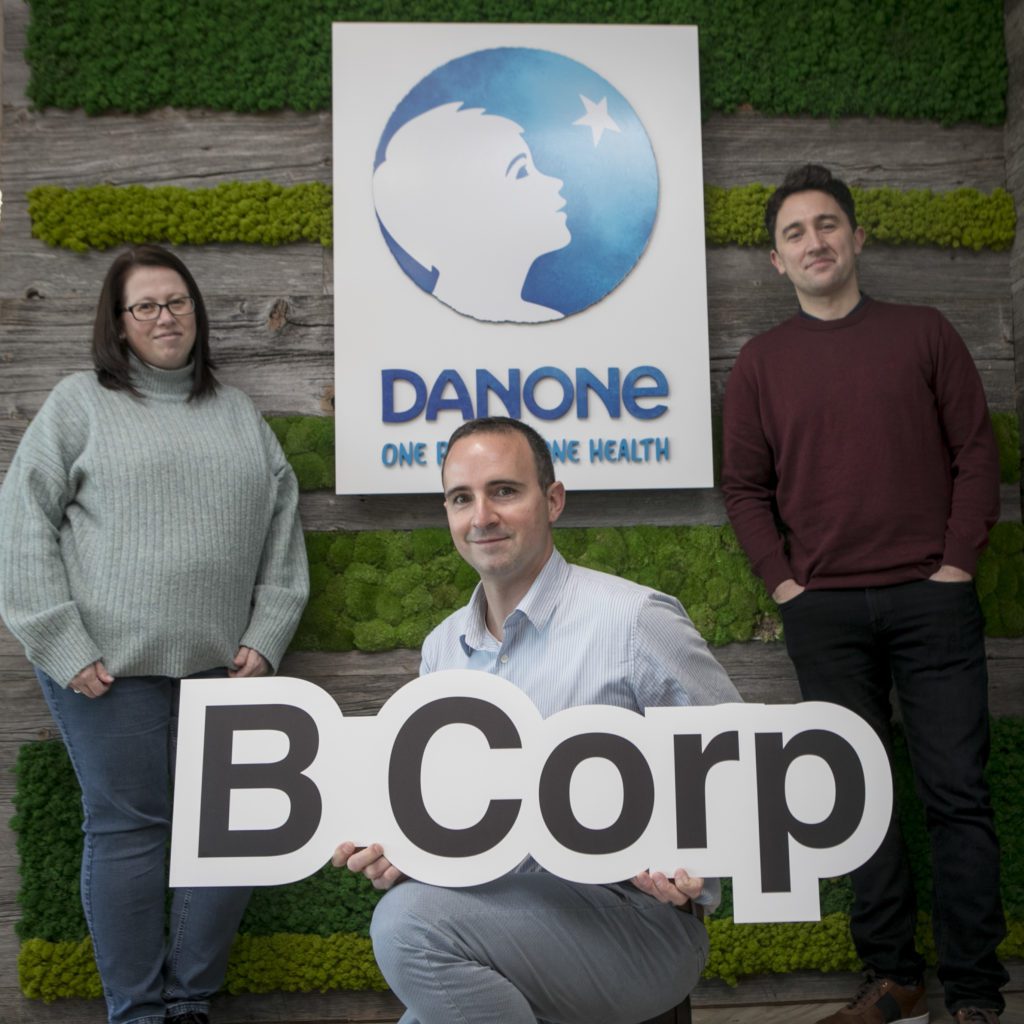
Celebrating the achievement at Danone Wexford, pictured are the B Corp team at Danone’s Wexford factory, Caryn Step, B Corp team lead, Jean-Francois Cournil, supply point director, and Ian Cullen, HR projects manager
All Danone Ireland’s operations, including its factories in Wexford and Macroom, are now B Corp certified, demonstrating Danone’s ongoing commitment to operating as a purpose driven business. B Corp businesses are verified by B Lab to meet high standards of social and environmental performance and public transparency, with a proven commitment to balance profit and purpose. The certification requires businesses to assess their practices across governance, workers, environment, community and customers.
Jean-Francois Cournil, factory director, Danone Wexford said: “Becoming fully B Corp certified is a significant achievement – and one we hope will motivate other companies to join the community of like-minded businesses. It’s fantastic to witness the growth of the B Corp Community in Ireland. Danone has been inspiring healthy habits that nourish life for over a century, so B Corp directly aligns with our own purpose for sustainable growth. Being part of the B Corp movement helps to accelerate collective progress to tackle the social and environmental issues we face.”
Employing more than 700 people in Ireland, Danone is the leading provider of specialised and medical nutrition products and services. Other B Corps in Ireland include Cully & Sully, FIID, Innocent and Tony’s Chocolonely.
Good things are taking root
Guinness is undertaking one of the most ambitious regenerative agriculture pilots to take place on the island of Ireland. Regenerative agriculture is an approach to farming that works in harmony with the natural environment to put back more than it takes out.
This extensive, three-year farm-based programme intends to highlight opportunities for reducing the carbon emissions of barley production. The key outcomes are expected to include: improvements in soil health and its carbon sequestration potential; enhanced biodiversity; reduction in synthetic fertiliser use; enhanced water quality; and improved farmer livelihoods. The ambition is for the barley grown to be used to brew beautiful tasting Guinness.
In the first phase in 2022, the programme will begin with at least 40 farms across spring and winter barley sowing. As the pilot develops, many more farmers will be engaged to take part.
A network of partners has been assembled to shape the design of this pilot including Boortmalt, Glanbia and Comex McKinnon, to understand the most effective regenerative practices, adapted to the local context and the specific needs of Irish barley production.
Walter Furlong Junior, one of the farmers involved in the pilot commented: “We’re delighted to be partnering with Guinness on this programme. The great thing about regenerative agriculture is the simplicity of the approach. It’s not a complicated process – it works in harmony with nature whilst providing a commercial benefit for farmers. We already use regenerative agricultural practices and have seen a marked improvement in the quality of the soil on our farm. It is a highly effective approach that leads to much better outcomes”.
The Minister for Agriculture, Food, and the Marine, Charlie McConalogue commented, “On behalf of the government, I welcome the pilot announced by Guinness. This pilot shows the importance of sectors working together to reduce emissions. It is welcome that one of Ireland’s most iconic brands is taking a strong leadership position on farming and the environment, as we all work towards reducing carbon emissions and meeting our ambitious but necessary climate change targets.”
John Kennedy, president, Diageo Europe, commented: “This pilot is the first such programme being implemented by Diageo and the outcomes will help inform other potential opportunities, not just in Ireland, but in other countries where we source raw materials.
This programme forms part of Diageo’s wider 10-year sustainability action plan, Society 2030: Spirit of Progress, and the company’s commitment to achieve net zero carbon emissions across its direct operations and a 50% reduction in scope 3 emissions by 2030.
Heineken Ireland winner at 2021 Green Food and Beverage Producer Awards
Heineken Ireland has been announced the Best Green Beverage Manufacturer (Alcoholic or Non-Alcoholic) at the 2021 Green Food and Beverage Producer Awards. Heineken Ireland was also the overall winner at the awards and was announced as Ireland’s leading Green Food and Beverage Producer.
The two major sustainability accolades were awarded to Heineken Ireland for their Brewing a Better World Sustainability Strategy, which the judges commended for its impressive commitments and delivery of improvements across a range of areas. Heineken has had a sustainability strategy for more than a decade and reports its progress across a range of targets every year. Within the strategy, Heineken Ireland has specific targets in areas such as reducing CO2 emissions, protecting water resources, moving towards a circular waste economy.
Heineken Ireland’s commitment to minimising waste is a reflection of their zero waste to landfill policy that is in operation at the Cork Brewery, under the Brew a Better World sustainability strategy. Projects such as their innovative re-purposing of the unused beer from pubs, hotels, nightclubs, and restaurants was noted by the judges of the Green Food and Beverage Producer Awards 2021 in their announcement. The brewer collected and converted beer and cider that was unused due to on-trade outlets being closed during the Covid pandemic into energy, animal feed and fertiliser.
Heineken Ireland collected more than 100,000 kegs of its lager, cider, and stout brands from the on-trade sector across Ireland to ensure that none of the product ended up as waste. The bulk of the product went to an anaerobic digestion plant, which generated enough energy to power 900 houses per year. The remaining by-product from this waste to energy process was then used in agricultural fertiliser. The beer in unopened kegs was re-purposed as animal feed. The company hired a new team to decant the beer safely and worked closely with local authorities and its recycling partners to allow for the auditing of all stages of the process to ensure they met the highest environmental standards.
“Sustainability is at the heart of everything that we do at Heineken, and I am delighted that our team has been recognised with these two prestigious awards,” said Heineken Ireland managing director Maarten Schuurman.
Guilt-free chocolate
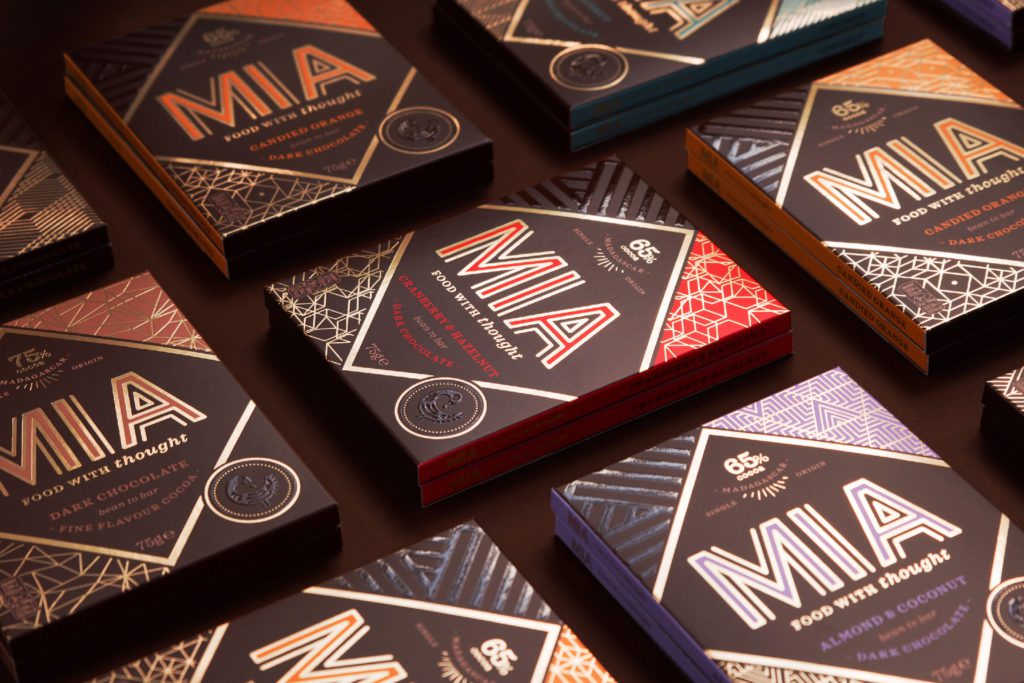
Ethical chocolate company, MIA, is now available in Donnybrook Fair
Bean-to-bar ethical chocolate company MIA, short for Made In Africa, has nine bars in its vegan range. The range is available now in-store at Donnybrook Fair stores – Greystones and Malahide – and online from ethical supply chain partner Proudly Made in Africa.
MIA’s entire range of chocolates is made from bean-to-bar in Madagascar as part of the company’s commitment to create more added-value and skilled jobs on the African continent that grows 70% of the world’s cocoa. According to MIA, the company now creates five times more value in Madagascar than the export of raw cocoa.
MIA Co-founder Brett Beach: “We are so excited that MIA is stocked in Donnybrook Fair stores. Donnybrook Fair has a great reputation for quality, and we believe that the combination of flavour and social impact will create lasting customers for MIA.”
MIA aspires to work with thousands of artisans in communities throughout the African continent to offer consumers a wide range of delicious foods that build on fair trade to set a new standard: ‘fair made.’
The entire chocolate making process – including the roasting, shelling, grinding, tempering and even packaging – takes place under one roof in Madagascar to utilise the freshest and best ingredients. All of the bars are crafted with fine flavour cocoa, a classification awarded to the top 10% of cocoa by the International Cocoa Organization.
The MIA brand is partnered with Proudly Made in Africa (PMIA) to ensure that products aren’t just made on the African continent but are ethically produced with as many locally sourced ingredients and materials as possible. The MIA supply chain of fourteen local partners is audited according to the Ethical Trading Initiative Base Code.
MIA is committed to a 1 for Change programme which ensures that 1% of all company sales are dedicated to development projects in places where a little goes a long way. Whether it’s projects to help save local endangered species or to improve a community’s livelihoods, the programme is central to the brand’s philosophy.
Sustainability to the forefront with Molson Coors’ ‘Our Imprint 2025 Goals’
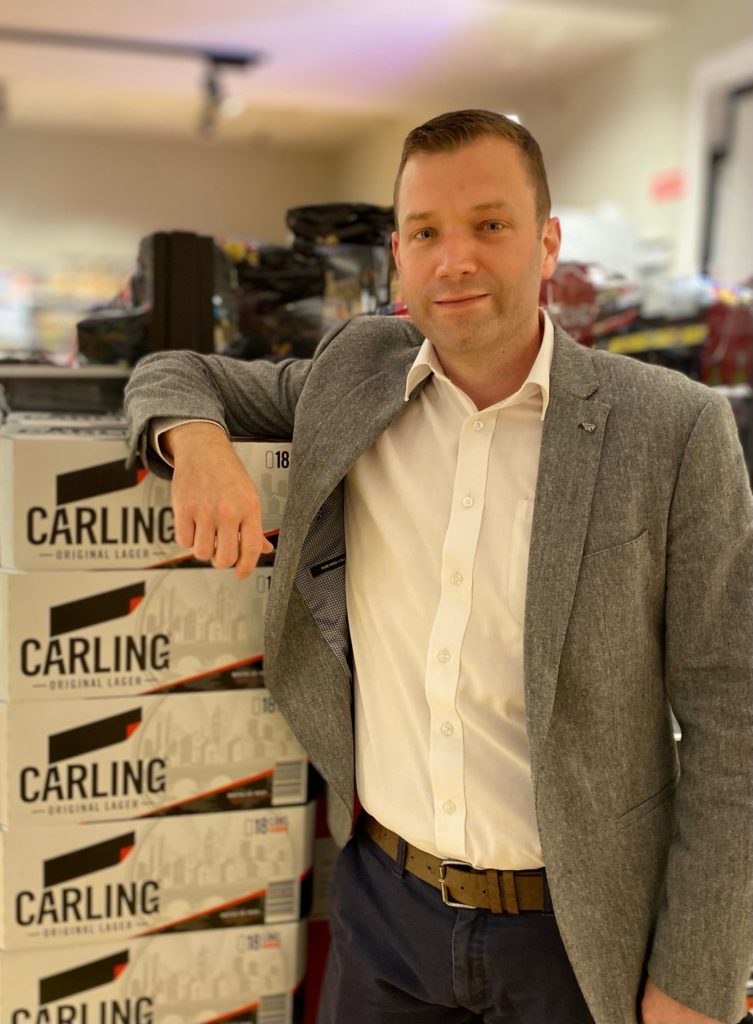
Shane O’Sullivan
Shane O’Sullivan, director of the off-trade in Ireland, Molson Coors Beverage Company, outlines how the group has successfully reduced both operational emissions and the environmental impact of its packaging through innovative thinking
Molson Coors is setting an impressive example for sustainability standards within the FMCG sector. In an ambitious aim, the company has pledged to lower absolute emissions by 50% within direct operations as part of its ‘Our Imprint 2025 Goals’. A target has also been established to achieve a 20% reduction in carbon emissions throughout its value chain within the same time frame. These goals have been verified by the Science Based Targets Initiative (SbTi), making Molson Coors one of the few leading companies to align its direct emissions reduction goal with the 1.5 degrees Celsius temperature increase target recommended by the Intergovernmental Panel on Climate Change (IPCC).
Reducing operational emissions
In March 2021, Molson Coors began to produce its beers sold in Ireland such as Carling, Molson Canadian and Miller Genuine Draft, using 100% renewable electricity when the group signed a Power Purchase Agreement (PPA) with RWE, one of the world’s leading renewable energy companies.
Molson Coors now uses electricity generated from the Tween Bridge wind farm in South Yorkshire, which produces the same amount of electricity as around 25,000 households a year.
This move puts the group ahead of its target to reduce operational emissions by 50% by 2025.
“Alongside this, our investment in CO2 recovery systems mean we can also recover and reuse up to 47 tons of CO2 from the fermentation process each day,” says Shane O’Sullivan, director of the off-trade in Ireland, Molson Coors Beverage Company.
“Our largest UK brewery in Burton, which produces many of the brands we sell in Ireland, has been almost entirely self-sufficient in CO2 production since 2018; removing around 2,350 tonnes of emissions from our operations each year,” he adds.
Packaging improvements
Importantly, Molson Coors has set global packaging targets to ensure that 100% of its packaging is reusable, recyclable or compostable by 2025. Last year, the company reached its target of removing all single-use plastic from across its major brands, helping to remove more than 700 tonnes of single-use plastic from the group’s operations through changes to packaging and minimising waste. What’s more, across its UK and Ireland territory, all of Molson Coors’ production sites are zero waste to landfill including the Franciscan Well Brewery in Cork.
Molson Coors has also conducted a trial with Staropramen, where two million low carbon bottles were produced that reduced the carbon footprint of each bottle by up to 90%, and significantly increased the recycled content of each bottle by using up to 100% recycled or waste glass – up from 75% previously used in its green glass bottles. O’Sullivan is encouraged by the results to date, noting: “We look forward to continuing to explore how we can implement this across our wider portfolio on a larger scale in the future.”
Save The Bees
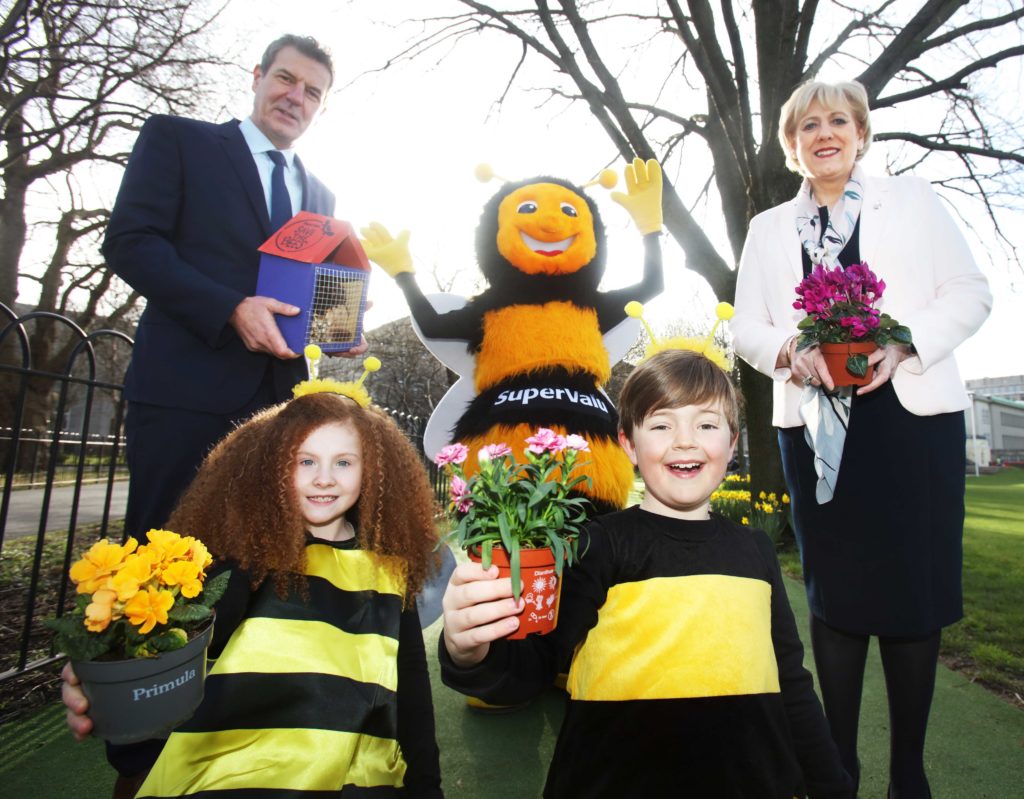
Ian Allen, SuperValu managing director and Minister for Rural and Community Development, Heather Humphreys, with children Maisie McLeod and Cooper Jones
SuperValu and Minister for Rural and Community Development, Heather Humphreys has launched the Save The Bees Campaign in partnership with the All-Ireland Pollinator plan and SuperValu TidyTowns. All 3,241 primary schools in Ireland will be sent a SuperValu Save the Bees Pollinator Pack so they can create their own bee-friendly garden.
This SuperValu Save the Bees Pollinator Pack was co-created with Dr Una Fitzpatrick, head of the All-Ireland Pollinator Plan and is endorsed by SuperValu TidyTowns. It contains guidebooks, posters and bookmarks in addition to a pollinator-friendly garden kit with flower seeds and a garden sign. All elements of the Save the Bees Pollinator pack have been sustainably sourced and are recyclable.
To further promote awareness and action, families will receive their own Save the Bees cards in SuperValu with every spend over €30. These cards are added to each school’s Save the Bees poster, which, once completed, can be entered into a draw to win a share of €50,000 for the school.
Minister for Rural and Community Development, Heather Humphreys said, “Protecting our pollinators helps in turn to protect our planet which is why I am thrilled to launch the SuperValu Save the Bees campaign. Educating our children and communities about the importance of pollinators is vitally important and I look forward to seeing bee-friendly school gardens pop up across the country in the coming weeks and months.”
As it stands, nearly one-third of Irish bees are in danger of becoming extinct. The loss of such a large portion of our bee population would be catastrophic. More than 75% of our plant species are animal pollinated. Bees are important pollinators of Irish produce like strawberries and apples and they ensure diverse wild plant communities across the countryside that help regulate climate, provide healthy spaces for recreation, and support other wildlife.
Commenting on the campaign, Ian Allen, SuperValu managing director said “At SuperValu, we are huge supporters of Irish producers and suppliers. We source 75% of our goods in Ireland, and we want to keep buying and supporting Irish and local, which is why we are so committed to protecting pollinators. We are delighted to work with the All-Ireland Pollinator Plan to make change through our Save the Bees campaign. There are simple steps we can all take to make Ireland a habitable ecosystem for bees and our SuperValu Save The Bees packs will provide support awareness, education and action for children across the country. This initiative will also give children the fantastic opportunity to win a share of €50,000 for their primary school.”
The SuperValu TidyTowns competition also recognises the value and importance of biodiversity. Nearly half (46%) of all TidyTowns committees say that biodiversity is their main priority area. More than 200 SuperValu TidyTowns committees have engaged with the All-Ireland Pollinator Plan and made their local areas significantly pollinator friendly. In 2021, Buncrana, Co. Donegal won the SuperValu TidyTowns’ All Ireland Pollinator Plan Local Authority Pollinator Award.
For more information on the SuperValu Save the Bees campaign visit https://supervalu.ie/real-people/save-the-bees
Zero waste movement
Reuzi was founded by sustainability strategist, speaker and writer Pat Kane in 2018, who is known for being a pioneer of the zero waste business movement in Ireland.
Dublin based Reuzi offers sustainable, non-toxic and plastic-free products for every part of life, working with mostly local brands to reduce their waste along the way.
Reuzi is truly a one-stop-shop for zero-waste versions of everyday essentials. From beauty and cleaning to pet and baby products, Kane and her team are making sustainable, non-toxic, and plastic-free products more convenient and affordable.
Kane says: “Since day one, Reuzi’s mission has been to make the world less wasteful and more conscious. When you swap products used daily for a Reuzi alternative, it’s easier than ever to cut down on plastic and individual waste and create a better future for all.”
Find out more about Pat Kane and her Reuzi mission at www.reuzi.ie.
Encouraging sustainability online
Less than one in every five consumers always consider sustainability when shopping online, according to recent Digital Insights research, commissioned by Ireland’s leading representative body for the sector, Digital Business Ireland. The research was carried out by Ireland Thinks, and is based on a nationally representative sample, collected from a pool of over 30,000 panellists.
As part of the survey, participants were asked how often, if ever, they consider sustainability when shopping online. The findings were assessed across a broad range of demographics – gender, income level, age and regional distribution. Overall, the research highlights the disparity between businesses’ ambitions and public attitudes. While many SMEs throughout Ireland are pivoting their operations to embrace environmentally friendly practices, consumers remain somewhat ambivalent – highlighting the pressing need for a more strategic approach from government and industry in encouraging sustainable shopping habits among the general public.
While more than a third (37%) of those earning less than 5k always prioritise sustainability when buying goods and/or services online, just 6% of participants earning over 80k do the same.
Overall, the research indicates the emergence of an indifferent attitude or lack of awareness towards sustainability among consumers, and suggests that while many Irish businesses have been proactive in championing sustainability, the communication of their message has yet to filter down to their customer base.
The representative body’s A Guide to Becoming a Sustainable Business devised in conjunction with Sustainability Works, and launched by Minister of State at the Department of Enterprise, Trade and Employment, Damien English offered advice on best practice for businesses looking to enhance their sustainability credentials.
Secretary General of Digital Business Ireland, Lorraine Higgins said: “Our research highlights the pressing need to bridge the gap between businesses’ ambitions and public attitudes. We need a dedicated national campaign that quantifies the value to consumers of shopping sustainably online, and offers incentives to those who purchase environmentally-friendly products and services. The heightened costs associated with buying sustainably are often identified as a deterrent by consumers – but we know that while this may be the case in the short term, creating greater demand will ultimately allow businesses to reduce their costs over time”.
Shopper Intelligence
Sustainability is becoming more and more an important aspect for grocery shoppers in general. But what aspects do they care about more? Recyclable packaging still leads the agenda, but shoppers are increasingly aware of the manufacturing process of the products they buy (the second top aspect in 2021, up from fourth position in 2020). The importance of sustainability varies category by category, too – see the Top 10 FMCG categories in 2021 on the infographic from Shopper Intelligence Ireland.
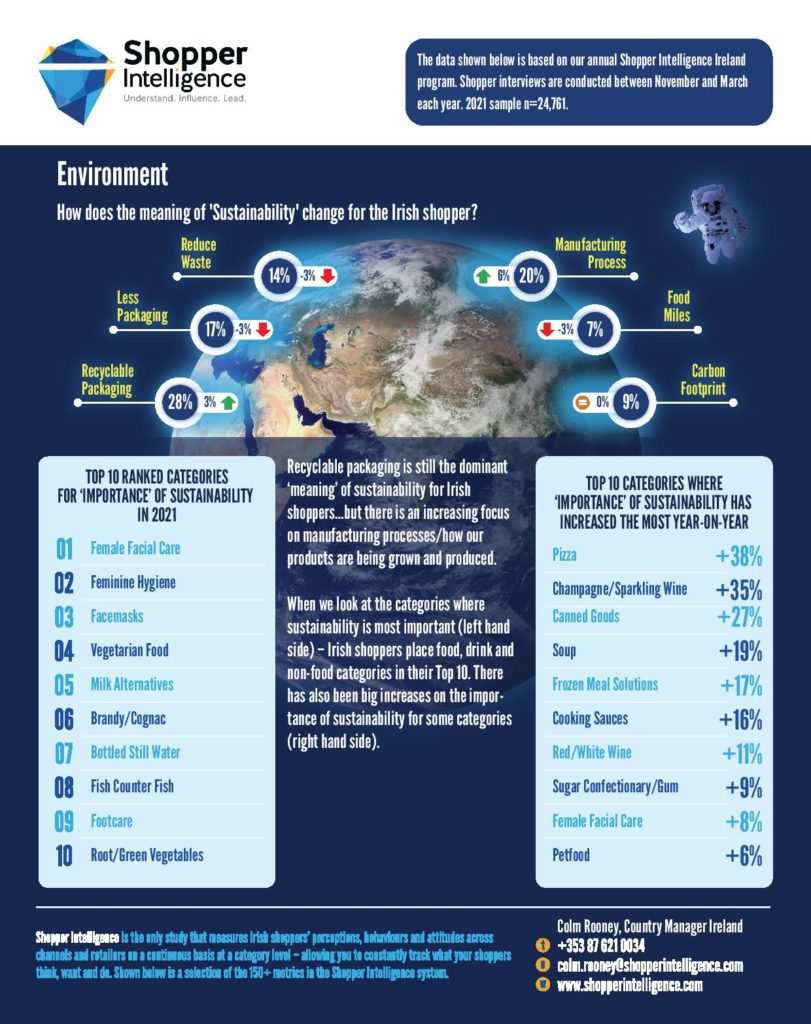



 Print
Print

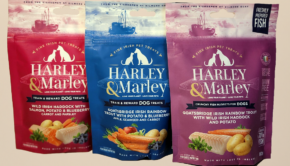




Fans 0
Followers